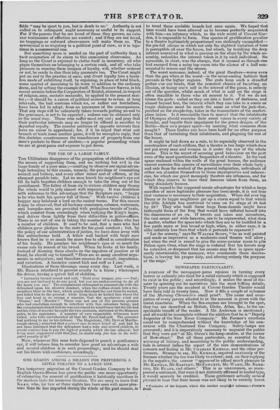ONE REASON AMONG A MILLION FOR PREFERRING A LITTLE THEATRE
TO A LARGE ONE.
THE temporary migration of the Covent Garden Company to the English Opera-House has given the public one more opportunity of estimating the amount of gratification it habitually sacrifices to the modern taste for immense theatres. We are sorry to learn that KEN, who, for two or three nights has been seen with more plea- sure than he has imparted during the whole of the past season, is to tread these enviable boards but once again. We hoped that time would have been allowed us to become perfectly acquainted with him—an intimacy which, in the wide world of Covent Gar- den, it is impossible to form. One species of gratification peculiar to a theatre legitimately proportioned was strikingly exemplified— the pin-fall silence in which not only the slightest variation of tone is perceptible all over the house, but which, by testifying the deep interest conceived in what is passing on the stage by the whole as- sembly, redoubles the interest taken in it by each individual. So agreeable, in short, was the change, that it seemed as though one had escaped from a noisy tap-room into the silence of a hall con.- secreted to reason and the muses.
The worst nuisance, indeed, of the great theatres—worse evert than the gas when at the worst—is the never-ending hubbub that prevails in the higher regions. The gods keep such a dreadfur pother o'er our heads, fiat the remotest chance of beeytting an illusion, or losing one's self in the interest of the piece, is entirely out of the question, whilst much of what is said on the stony is often inaudible to those who sit nearest to it. Yet we a not blame the gods : exiled as they are into a limbo of darkness, and almost beyond ken, the interest which they can take in a comic or tragic dialogue must be much the same as what the jack-daw, perched on the steeple-top, takes in the transactions of the market- place below. Is it reasonable then to marvel that the inhabitants of Olympus should exercise their sweet voices in every variety of thunder, and beguile their impatience for the green dragon of the Bottle—their own proper spirit—by marring what concerns then nought ? These limbos can have been built for no other purpose than that of tantalizing their inhabitants, and plaguing the rest of the house.
It might be laid down as a rule, to be especially observed in the construction of such edifices, that a theatre is too large which does not put every man and woman in it under the eye of the whole house. This is the secret of securing good behaviour on the part even of the most questionable frequenters of a theatre. In the vast space enclosed within the walls of the great houses, the audience cannot exercise this species of surveillance over their whole body ; and safe from the control of the general indignation, individuals of either sex abandon themselves to those improprieties and indecen- cies, for which our great monopoly theatres are infamous, and for which they deserve to have their licences taken from them, as beimg disorderly houses. With regard to the supposed scenic advantages for which a large sacrifice of more legitimate pleasure has been made, it is not true that vastness is necessary to their acquisition. When did ever big Drury or its bigger neighbour get up a storm equal to that which the little Adelphi has contrived to raise on its stage of 30 feet by 20? They who built these huge Dom-daniels might have bethought them of the frog that would have inflated herself into the dimensions of an ox. If forests and lakes and mountains, the vast ocean and wide heavens, are to be represented, what does it matter, whether the space into which they are to be huddled be a few yards more or less broad or high, when, in either case, it is alike infinitely less than that which it pretends to represent ? "Let the scenery," says Sir WALTER SCOTT, "be as well painted and made as impressive as a moderate-sized theatre will allow ; but when the roof is raised to give the scene-painter room to pile Pelion upon Ossa, when the stage is widened that his forests may be extended, or deepened that his oceans may flow in space appa- rently interminable, the manager, who commands these decora- lions, is leaving his proper duty, and altering entirely the purpose of the stage."


















 Previous page
Previous page